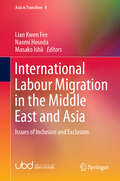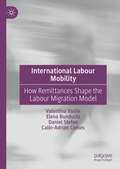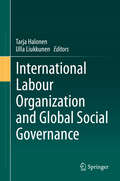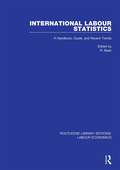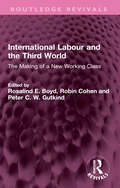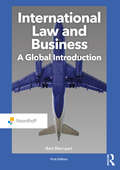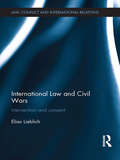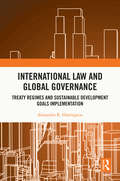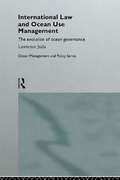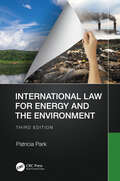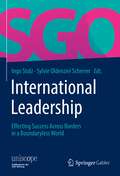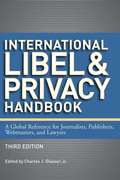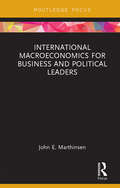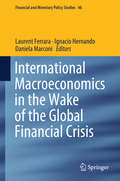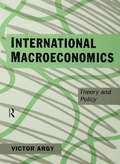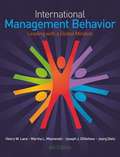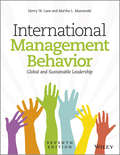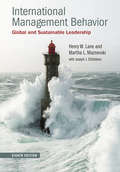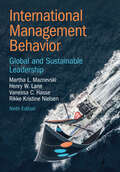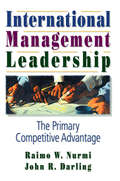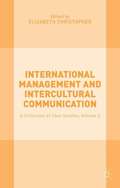- Table View
- List View
International Labour Migration in the Middle East and Asia: Issues of Inclusion and Exclusion (Asia in Transition #8)
by Kwen Fee Lian Naomi Hosoda Masako IshiiThe discourse on migration outcomes in the West has largely been dominated by issues of integration, but it is more relevant to view immigration in non-Western societies in relation to practices of exclusion and inclusion. Exclusion refers to a situation in which individuals and groups are usually denied access to the goods, services, activities and resources associated with citizenship. However, this approach has been criticised in relation to gender issues, which are very relevant to the situation of migrants. The authors in this volume address this criticism. Furthermore, when framed within a North–South discourse, it may be potentially ethnocentric to assume that the experience of exclusion is cross-culturally uniform. Indeed, work on migration issues has invariably been conducted within such a discourse. The contributors go beyond this binary discourse of ‘exclusion versus inclusion’ which has dominated migration research. They examine the situation of migrants in the Middle East and Asia as one that encompasses both exclusion and inclusion, addressing related concepts of empowerment, ethnocracy, the feminisation of migration and gendered geographies of power, liberal constraint and multiculturalism, individual agency, migrant-friendly discourses, spaces of emancipation and spaces of insecurity. The book highlights current research in the Arab Gulf states, and examines multiculturalism in Asia more broadly. It will be of particular interest to students and researchers in international labour migration studies in the Middle East and Asia.
International Labour Mobility: How Remittances Shape the Labour Migration Model
by Valentina Vasile Elena Bunduchi Daniel Stefan Calin-Adrian ComesThis book provides a multidisciplinary analysis of the links between migration and remittances. The role of remittances in influencing migration decision is explored in relation to economic development, education, the labour market, and social factors. The impact of remittances on migration is examined from a global perspective, with a focus on both specific countries and larger regions, such as the European Union and the former Soviet states. The challenges in managing migration flows are also discussed, alongside the impact of COVID-19 on migration, and policy suggestions are made for the efficient management of labour migration.This book aims to offer a comparative analysis of the impact of remittances resulting from labour migration and foreign direct investment on the economic growth. It will be relevant to researchers and policymakers interested in labour and migration economics.
International Labour Organization and Global Social Governance
by Ulla Liukkunen Tarja HalonenThis open access book explores the role of the ILO (International Labour Organization) in building global social governance from multiple and mutually complementary perspectives. It explores the impact of this UN´s oldest agency, founded in 1919, on the transforming world of work in a global setting, providing insights into the unique history and functions of the ILO as an organization and the evolution of workers’ rights through international labour standards stemming from its regulatory mechanism.The book examines the persistent dilemma of balancing the benefits of globalization with the protection of workers. It critically assesses the challenges that emerge when international labour standards are implemented and enforced in highly diverse regulatory frameworks in international, regional, national and local contexts. The book also identifies feasible ways to achieve more inclusive labour protection, putting into perspective the tension between the economic and the social in the ILO’s second century of operation. It includes reflections on the work of the ILO World Commission on the Social Dimension of Globalisation by Tarja Halonen, who as President of Finland co-chaired the Commission with Benjamin William Mkapa, President of Tanzania.Written by distinguished experts and scholars in the fields of international labour law and international law, the book provides an insightful and in-depth analysis of the role of the ILO as an international organization devoted to decent work and social justice. It also sheds light on tripartism and its particular role in the work of the ILO, examining the challenges that a profoundly changing working life presents in terms of labour protection and social justice, and examining the transnational dimension of labour law. Lastly, the book includes a postscript by Nobel economics laureate Professor Joseph E. Stiglitz.
International Labour Statistics: A Handbook, Guide, and Recent Trends (Routledge Library Editions: Labour Economics #3)
by R. BeanFirst published in 1989. The oil crises of the 1970s and increasing international competitive pressures had profoundly changed the structure and performance of labour. Analysis of labour markets, and especially international comparisons, can be difficult, given the differences between definitions, scope, coverage of data, methods, presentation, and economic and social influence in different regions. This book is an invaluable guide for users of international labour statistics. It centralizes and co-ordinates, from a range of sources, basic statistical information regarding the labour force for a large number of countries. Individual chapters, by specialists in the particular subject areas, deal with eight key aspects relating to the labour markets of major, developed capitalist countries (OECD countries); working population, unemployment, wages, consumer prices, labour costs, hours of work, trade union membership, and industrial disputes. The book discusses the nature of the data sources and statistical compilations, highlights cross-national trends over the past fifteen years, outlines the inherent difficulties of making such cross-country comparisons, and points out the potential pitfalls of interpretation of which users are often insufficiently aware. The book includes a summary of key labour market data, on an individual country basis, for twenty-four OECD countries and twenty other countries.
International Labour and the Third World: The Making of a New Working Class (Routledge Revivals)
by Robin Cohen Peter C.W. Gutkind Rosalind E. BoydOriginally published in 1987, this book focusses on the debate around the international role of the working class and other dominated classes such as the rural and urban poor. The contributions discuss whether Marx’s original version of the revolutionary role of workers can still be sustained. They examine the response of workers to the globalisation of production, to structural unemployment in the industrialized world and to the changing composition of the workforce in the industrialising periphery. The volume questions the historic starting points in the theorization of international labour.
International Law and Business: A Global Introduction (Routledge-Noordhoff International Editions)
by Bart WernaartThis book introduces law in the context of international business. The basics of law are explored using a clear comparative methodology. International and regional economic institutions are discussed, next to the fundaments of private law. These include contract law, liability law, labour law, company law, privacy law, intellectual property law and international private law. The book goes beyond the usual focus on Western legal systems and uses examples from all over the world to provide students with comprehensive knowledge of business law. It is set up rather broadly, so that it can be used by teachers throughout their entire curriculum. Each chapter ends with a clear summary, and practice questions. Due to its colourful cases, this book is accessible and fun to read.
International Law and Civil Wars: Intervention and Consent (Law, Conflict and International Relations)
by Eliav LieblichThis book examines the international law of forcible intervention in civil wars, in particular the role of party-consent in affecting the legality of such intervention. In modern international law, it is a near consensus that no state can use force against another – the main exceptions being self-defence and actions mandated by a UN Security Council resolution. However, one more potential exception exists: forcible intervention undertaken upon the invitation or consent of a government, seeking assistance in confronting armed opposition groups within its territory. Although the latter exception is of increasing importance, the numerous questions it raises have received scant attention in the current body of literature. This volume fills this gap by analyzing the consent-exception in a wide context, and attempting to delineate its limits, including cases in which government consent power is not only negated, but might be transferred to opposition groups. The book also discusses the concept of consensual intervention in contemporary international law, in juxtaposition to traditional legal doctrines. It traces the development of law in this context by drawing from historical examples such as the Spanish Civil War, as well as recent cases such those of the Democratic Republic of the Congo, Somalia, Libya, and Syria. This book will be of much interest to students of international law, civil wars, the Responsibility to Protect, war and conflict studies, and IR in general.
International Law and Global Governance: Treaty Regimes and Sustainable Development Goals Implementation
by Alexandra R. HarringtonThis book explores the methods through which international law and its associated innovative global governance mechanisms can strengthen, foster and scale up the impacts of treaty regimes and international law on the ability to implement global governance mechanisms. Examining these questions through the lens of the Sustainable Development Goals (SDGs), the book looks at environmental, social and economic treaty regimes. It analyses legal methodologies as well as comparative methods of assessing the relationship between the SDGs and treaty regimes and international law. Contradictions exist between international treaty regimes and principles of international law resulting in conflicting implementation of the treaty regimes and of global governance mechanisms. Without determining these areas of contest and highlighting their detrimental impacts, the SDGs and other efforts at global governance cannot maximize their legal and societal benefits. The book concludes by suggesting a path forward for the SDGs and for international treaty regimes that is forged in a solid understanding and application of the advantages of global governance mechanisms, including reflections from the COVID-19 pandemic experience. Addressing the strengths, gaps and weaknesses related to treaty regimes and global governance mechanisms, the book provides readers with a comprehensive understanding of this increasingly important topic. It will be of interest to students, researchers and practitioners with an interest in sustainability and law.
International Law and Ocean Management: The Evolution Of Ocean Governance (Routledge Advances in Maritime Research)
by Lawrence JudaThis book places contemporary problems of ocean use management in historical context beginning with the time of Hugo Grotius, whose seminal 1609 work The Freedom of the Seas was the basis of ocean law for the next three centuries. Individual use problems are dealt with in detail and include overfishing, migrating fish stocks and fish wars, oil drilling, deep sea mining and marine pollution. Throughout the author notes the need to seek solutions in ocean management from a more integrated perspective. Emphasis is placed on the United Nations Conference on the Law of the Sea and the resulting agreements. This book therefore presents a unique breadth of view which will make it salient to policy makers, diplomats, scholars and ocean users.
International Law for Energy and the Environment
by Patricia ParkThis revised edition of Energy Law and the Environment considers how international and national legislation now requires the energy sector to focus more on sustainability and the circular economy in response to new policies at both international and national levels. It explores how environmental law engages with multinational companies regarding energy sources, ownership of those resources, and state sovereignty. Written for all the players in the energy sector, lawyers and non-lawyers alike, this third edition considers the issues of energy sector regulation related to economics and protection of intellectual property associated with the development of technologies for mitigating environmentally damaging emissions. It has been updated throughout and adds new and fully revised chapters on subjects, including climate change, human rights, renewable energy, and energy law in China. Features: Updated throughout and adds new and fully revised chapters Focuses on the global trends and mandates towards environmental sustainability Examines the latest international legislation involving climate change Includes the coverage of oil and gas industries, as well as nuclear and renewable energy
International Leadership: Effecting Success Across Borders in a Boundaryless World (uniscope. Publikationen der SGO Stiftung)
by Ingo Stolz Sylvie Oldenziel ScherrerThis edited volume strives to support leaders in successfully leading their teams, projects and organizations across borders in an increasingly boundaryless world. From both an academic’s and a practitioner’s perspective, the book focuses on international leaders and their potential to be or become enablers of international success, for and within their respective organizations. The authors are a curated selection of established experts, seasoned leaders, and new voices showcasing novel research, best practices, and business cases. The contributions are assigned to three sections, corresponding to the three core challenges of international leadership: Leading international organizations, leading international teams, and (self)leadership with intercultural excellence. An additional section is dedicated to case studies, exhibiting these challenges in practice.The Foundation of the Swiss Society for Organization and Management (SGO) as well as Innosuisse – Swiss Innovation Agency supported the creation of this book.
International Libel and Privacy Handbook
by Charles J. Glasser Jr.An indispensable survival guide for anyone in the media industry and the lawyers who serve them Especially now, in an age of instant global access through digital media, it is vitally important that journalists, authors and publishers, as well as the lawyers who serve them, be fully up on the laws governing media, worldwide. The ultimate resource for all the media content providers and purveyors, this fully updated and expanded Third Edition of the critically-acclaimed handbook offers you instant access to relevant libel and privacy laws and important legal rulings in the Europe, Asia, the Middle East and the Americas. It clearly and concisely explains risks publishers should know about prior to publication, steps they can take in order to avoid legal conflicts, and legal defences available to them in the event of a claim. Offers nation-by-nation summaries of libel and privacy law written by local practitioners in an easy-to-use reference format Expanded to include coverage of important emerging territories--Mexico, Israel, and Argentina, et al--as well as the latest libel and privacy rulings Features new chapters on emerging media markets--including Israel, Mexico, Argentina, Jordan, and others--as well as valuable updates to the Middle East section Provides updates on all major media markets and nations, along with coverage of changes in libel laws in key jurisdictions, including Australia, the UK, Hungary and Germany
International Liquidity and the Financial Crisis
by William A. AllenIn the ongoing financial crisis, policy makers have for the most part appeared to be reactive, formulating emergency solutions as events unfold. However, in contrast to their performance during the Great Depression, central banks around the world, led by the Federal Reserve, acted decisively following the collapse of Lehman Brothers and provided huge injections of liquidity into the financial markets, thereby preventing a far worse outcome. International Liquidity and the Financial Crisis compares the 2008 crisis with the disaster of 1931 and explores the similarities and differences. It considers the lasting effects of the crisis on international liquidity, the possibilities for an international lender of last resort, and the enlargement of the International Monetary Fund after the crisis. It shows that there is no clear demarcation between monetary and macro-prudential policies, and discusses how central banks need to adapt to a new environment in which global liquidity is much scarcer.
International Lobbying and The Dow Chemical Company (A)
by Arthur A. DaemmrichThis case explores company strategy, business-government relations, and collective action challenges associated with international and domestic lobbying regarding regulation of the chemical industry. In the fall of 2006, a five-year legislative process for a major new law regulating chemicals in the European Union appeared to be nearing its conclusion. REACH, the Registration, Evaluation, Authorization, and Restriction of Chemicals, would create a new European Chemicals Agency, require companies to submit testing data on existing and new compounds, and restrict the manufacture of hazardous substances. Andrew Liveris, CEO of the Dow Chemical Company, has to decide whether the company should engage in direct discussions with the European Parliament and Commission, with the implication that the company can influence the regulations but also would have to support the final outcome. The case summarizes Dow's history, competitive dynamics in the sector, and regulation of the chemical industry before describing the REACH legislative process and various approaches to lobbying used by chemical companies, trade groups, and environmental NGOs.
International Luxury Brand Strategy
by Pierre Xiao LuThis book looks at luxury brand management and strategy from theory to practice and presents new theoretical models and solutions for how to create and develop a worldwide luxury brand in the twenty-first century. The book gives an overview of how a luxury brand is created through the understanding and application of economic rules and through firms adopting new management models across multiple business dimensions. It also explains the application of theories and models and illustrates specific issues through case studies drawn from international markets such as China and France. The Chinese cases provide unique opportunities and insights into how these new luxury brands were created and how they have benefited from the international market over time. From the international brand management perspective, this book is a useful reference for anyone who wants to learn more about luxury brand management and to better understand how the international market has evolved and how products may change the rules of the game.
International Macroeconomics for Business and Political Leaders (Routledge Focus on Economics and Finance)
by John E. MarthinsenInternational Macroeconomics for Business and Political Leaders explains the fundamentals of international macroeconomics in a very efficient and approachable text. It explores key macro concepts such as growth, unemployment, inflation, interest, and exchange rates. Crucially, it also examines how these markets are interconnected so that readers will fully understand why economic, political, and social shocks to nations, such as the United States, China, Germany, Japan, and Brazil, must be evaluated in the context of all three macroeconomic markets: goods and services, credit, and foreign exchange. This book is as relevant and useful to individuals who have successfully taken and passed a Principles of Economics course, or more, as it is to those who have never taken any economics in high school or college but are motivated to understand the way international economies act and react. It uses an innovative approach to teach supply and demand principles, without using graphs, so as to be understandable and accessible to any interested reader or audience. This is not a theory-for-theory’s-sake textbook but a practice-oriented, common-sense approach to explaining international macroeconomics which quickly connects readers to real world events.
International Macroeconomics in the Wake of the Global Financial Crisis (Financial and Monetary Policy Studies #46)
by Daniela Marconi Laurent Ferrara Ignacio HernandoThis book collects selected articles addressing several currently debated issues in the field of international macroeconomics. They focus on the role of the central banks in the debate on how to come to terms with the long-term decline in productivity growth, insufficient aggregate demand, high economic uncertainty and growing inequalities following the global financial crisis. Central banks are of considerable importance in this debate since understanding the sluggishness of the recovery process as well as its implications for the natural interest rate are key to assessing output gaps and the monetary policy stance. The authors argue that a more dynamic domestic and external aggregate demand helps to raise the inflation rate, easing the constraint deriving from the zero lower bound and allowing monetary policy to depart from its current ultra-accommodative position. Beyond macroeconomic factors, the book also discusses a supportive financial environment as a precondition for the rebound of global economic activity, stressing that understanding capital flows is a prerequisite for economic-policy decisions.
International Macroeconomics: Theory and Policy
by Victor ArgyInternational Macroeconomics: Theory and Policy offers phenomenal coverage across the entire subject of international macroeconoimics in an open economy context. The book has four objectives: * to describe the evolution of and experiences with global exchange rate regimes * to introduce the reader to a rigorous analysis of open economy models * to apply the model framework to address key policy issues * to review individual country experiences of macro policy
International Management Behavior
by Lane Martha Maznevski Henry W. Joerg Deetz Joseph DistefanoNow in its sixth edition, International Management Behavior continues to help students develop the knowledge, perspective, and skills they need in order to conduct global business successfully. The combination of well-chosen, new and classic cases, as well as a completely revised text, provides excellent exposure to real-life management issues and a field-tested framework for understanding cross-cultural dynamics. Elimination of the readings has provided for greater flexibility and customization. For the sixth edition, the structure of the book has been totally revised and the text thoroughly updated to Reflect the authors' recent experiences. Material in the original chapters has been expanded and there are new chapters on managing change in global organizations and one on managing global teams and networks. The concept of the global mindset is used as the integrating theme that establishes a framework for the book making it applicable at both individual/team and organization levels. This book continues its tradition and orientation about managing people from different cultures and managing global organizations to get effective results. "This is much more than a new edition. It is a huge step forward. The strategy and culture chapters get in much closer to the small, focused details that make such a difference in implementation and that are so difficult to teach. Separating out personal integrity and corporate citizenship allows for a close examination of critical issues that are all too often glossed over. The expanded explanation of the MBI model works well. " Jeanne McNett, Assumption College
International Management Behavior: Global and Sustainable Leadership
by Henry W. Lane Martha L. MaznevskiThis is the seventh edition of International Management Behavior, an established text for students and executives developing the knowledge, perspective and skills required for leading and managing people in global business. This guide provides a comprehensive overview of international management, structured around the core challenges and opportunities faced by global managers. This encompasses: the role of the global manager, working on an individual and organizational level, and understanding how to manage a diverse workforce. Individual chapters address key subjects, including: the global mindset, working effectively across cultures, strategy execution, change management and working in global teams. This edition has been thoroughly updated to reflect recent developments in ethics and corporate sustainability. Based on over 40 years of teaching and research, International Management Behavior 7e is designed to stimulate and facilitate learning. This text combines a wealth of theoretical knowledge with current real-world examples across a range of cultures and industry sectors. The authors focus on research that provides the most immediate, practical guidance for managers, with well-chosen examples to demonstrate practical implementation and bring key concepts to life. To accompany the revised and updated seventh edition of International Management Behavior, updated instructor support material has been supplied at www.wiley.com/go/lane7e, including PowerPoint slides and teaching notes. This instructor site has been designed in conjunction with the main text to assist the teaching and development of global leaders.
International Management Behavior: Global and Sustainable Leadership
by Henry W. Lane Martha L. MaznevskiNow in its eighth edition, this is the textbook for current and future global leaders wanting to lead competently and sustainably in their business practices. Fully updated, the authors build on their forty years of teaching, researching and working with managers worldwide to bring students the latest developments in global business practice. Now including end-of-chapter reflection questions to guide topic comprehension, and directed further resources to assist individual research, this edition also sees the return of Ivey Business School and IMD cases in the book. This edition also includes a new conception of mindful global leadership as the integrating framework for execution of global strategy, highlighting the importance of a holistic approach to working across cultures and distance. Combining a wealth of theoretical knowledge with real-world examples from diverse cultures, countries and industry sectors, the practical guidance and well-chosen examples throughout the book bring key concepts to life.
International Management Behavior: Global and Sustainable Leadership
by Martha L. Maznevski Henry W. Lane Vanessa C. Hasse Rikke Kristine NielsenRigorously revised, the ninth edition of this successful, established textbook is ideal for current and future global leaders who want to lead international businesses sustainably and with impact. Combining a wealth of theoretical knowledge with real-world situations from diverse cultures, countries and industries, the book brings key concepts to life, while offering tools and strategies for putting them into practice. Reflecting global trends, this new edition features a greater focus on culture, virtual teams, leadership paradoxes, digital transformations, and a mindset-centered approach to dynamic change. All-new examples and cases contribute to bringing the book completely up to date, while reflection questions and a rich suite of online teaching resources (including suggested student exercises and classroom activities, teaching notes, further resources, and access to Aperian Globesmart), make this an essential tool for developing mindful, global leaders.
International Management Group (IMG)
by Bharat N. Anand Kate AtteaIn 2001, International Management Group (IMG) is the dominant company in the sports management industry. Its founder and CEO, Mark McCormack, is credited with having created the industry of sports management in the early 1960s. Over the next 40 years, IMG's expansion from athlete representation into other arenas--including representing models and classical music artists, producing and broadcasting television shows, operating training academies, corporate consulting, and financial planning--has been both dramatic and successful. This case describes the company's logic behind each expansion decision, as well as several challenges that the company has had to confront, specifically, maintaining the loyalty of the agents and clients, avoiding conflicts of interest with clients by virtue of the company's broad reach, deciding where to expand next, and meeting the challenge of increased competition from other sports management conglomerates.
International Management Leadership: The Primary Competitive Advantage
by Erdener Kaynak John R DarlingThe primary competitive advantage that firms have today is the perspective, outlook, and commitment of their management leaders. International Management Leadership helps you develop the leadership skills that will enable your firm to stay competitive in today's global business environment. From the necessary international perspective, this book provides you with the information you need to understand the competitive factors that distinguish one firm from another and to recognize the determinants of success.Giving you formats and outlines and a fresh perspective of your work, your organization, and yourself, International Management Leadership is much more practical than other management textbooks. You'll learn how to help make your company more effective in the arena of international management leadership as you read about:requirements of and special demands on international managersmanagerial leadership in the era of knowledgestrategic leadership and implementation of strategymanagement as a fulfillment of purposeleadership of conflict managementtransformational leadershipteam leadershipWhether you're an individual involved in a management training program, a management consultant, an executive manager, or a student of international management or business, you'll appreciate this book's take on the competitive factors of leadership in international business today. As a textbook, International Management Leadership provides students with a broad perspective on the practice of managerial leadership and organizational life in the global arena--bringing examples to life and going far beyond what is needed to simply pass a course.
International Management and Intercultural Communication: A Collection of Case Studies
by Elizabeth ChristopherInternational Management and Intercultural Communication.
